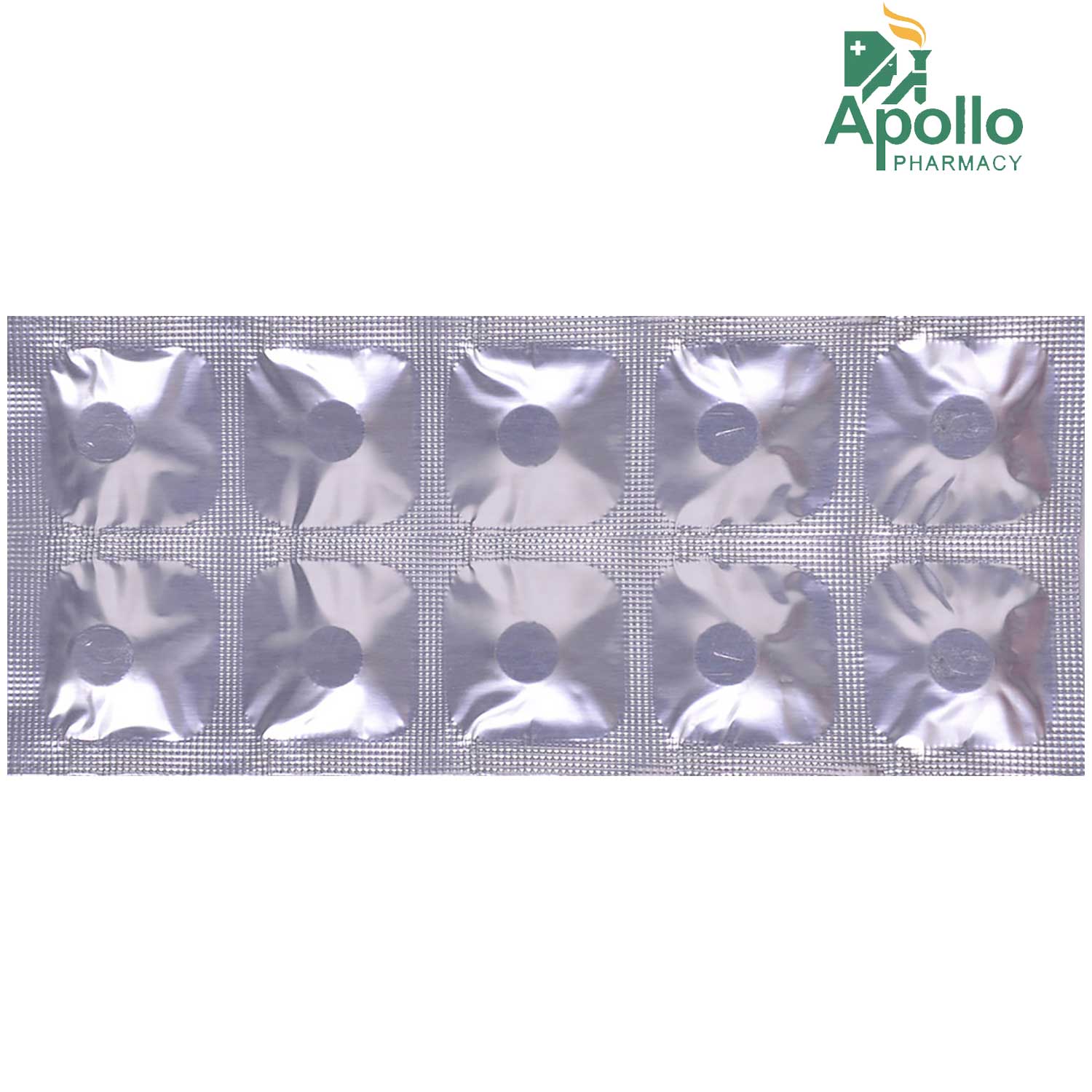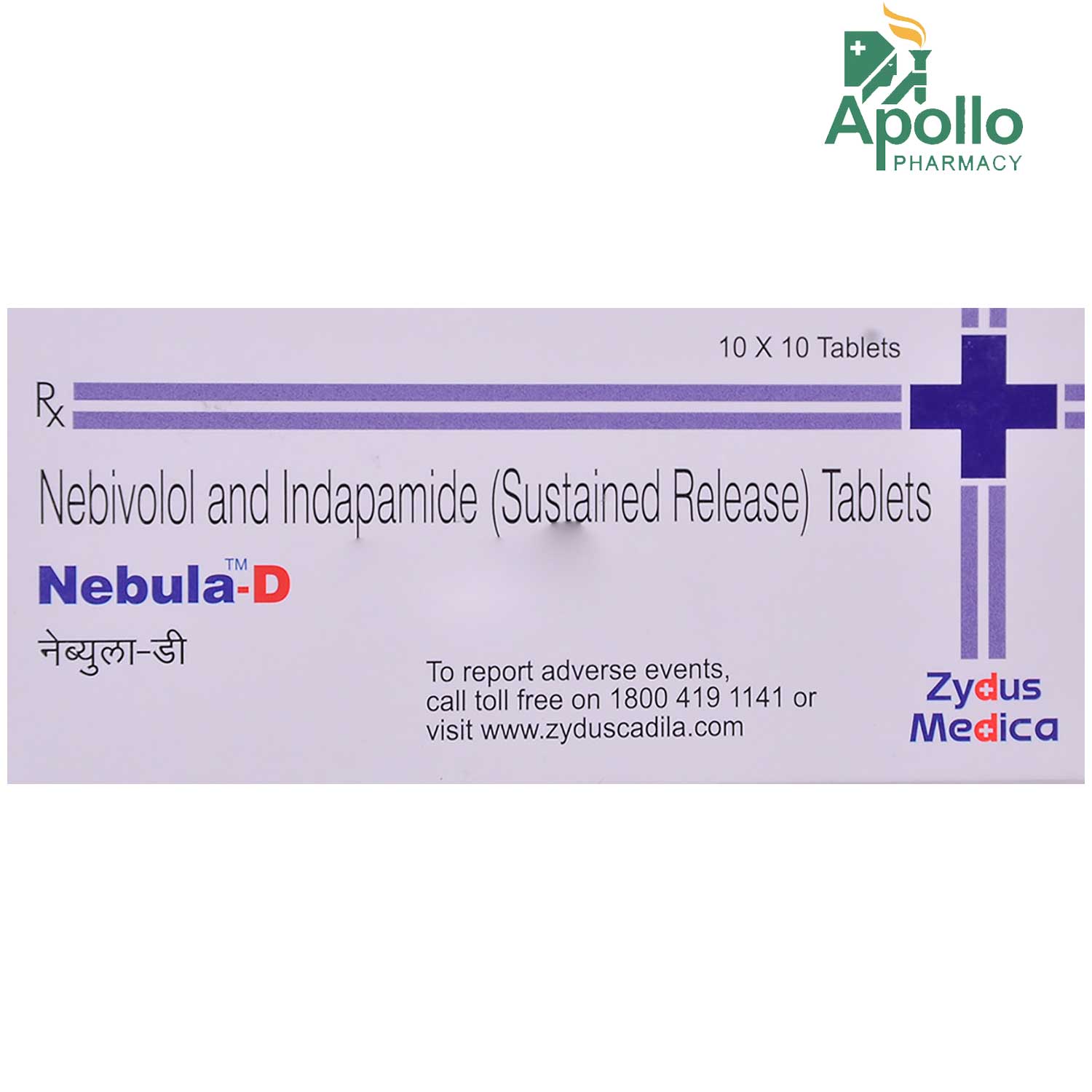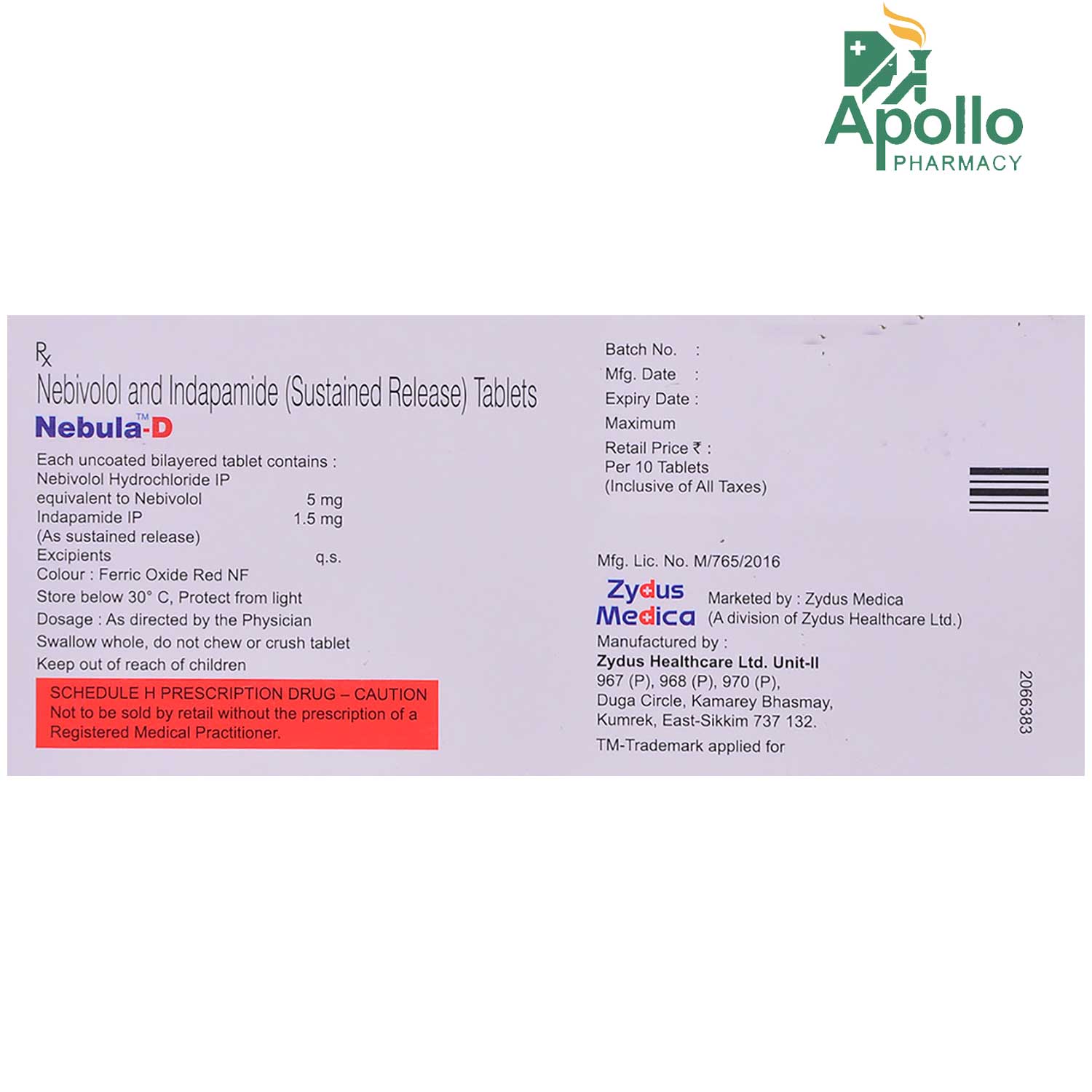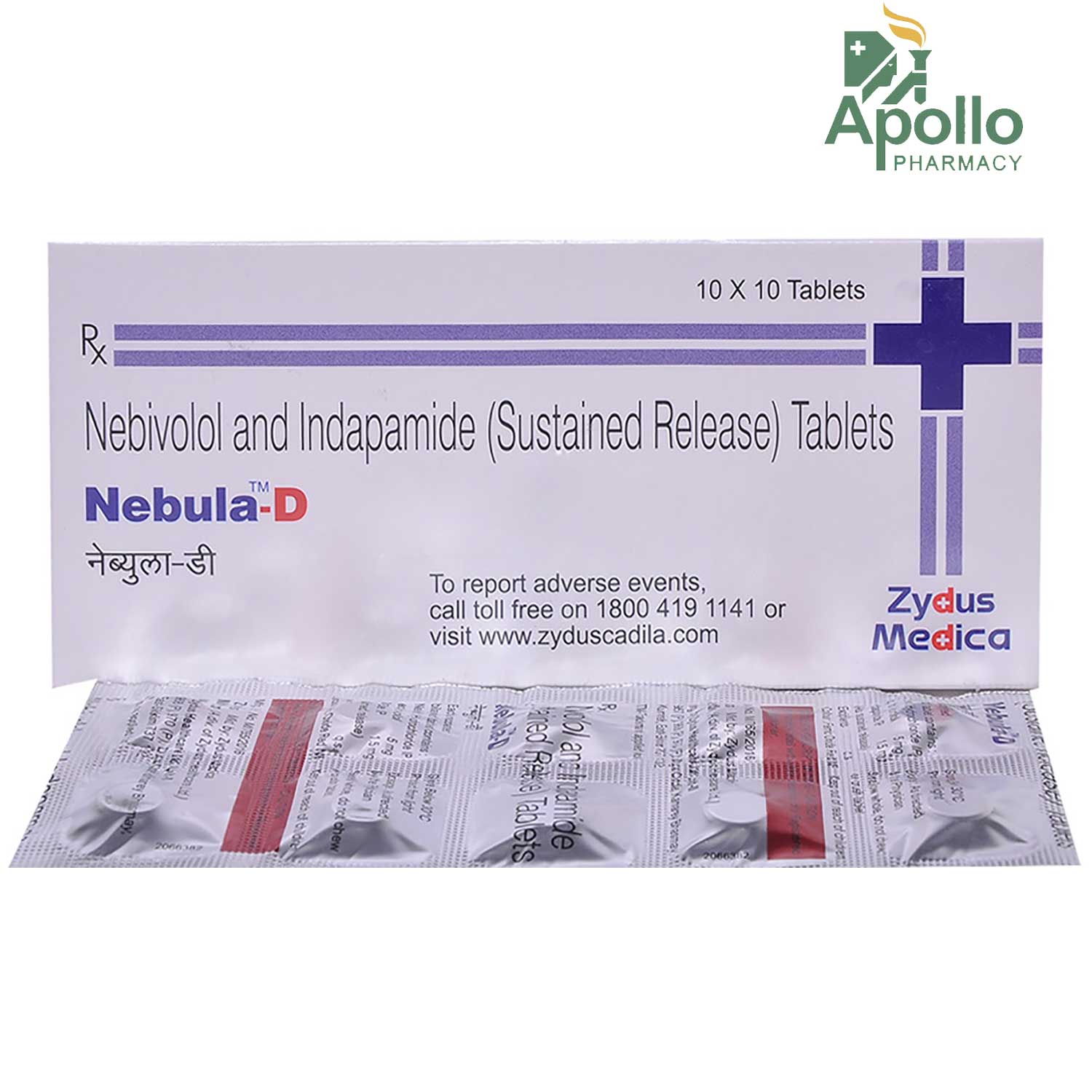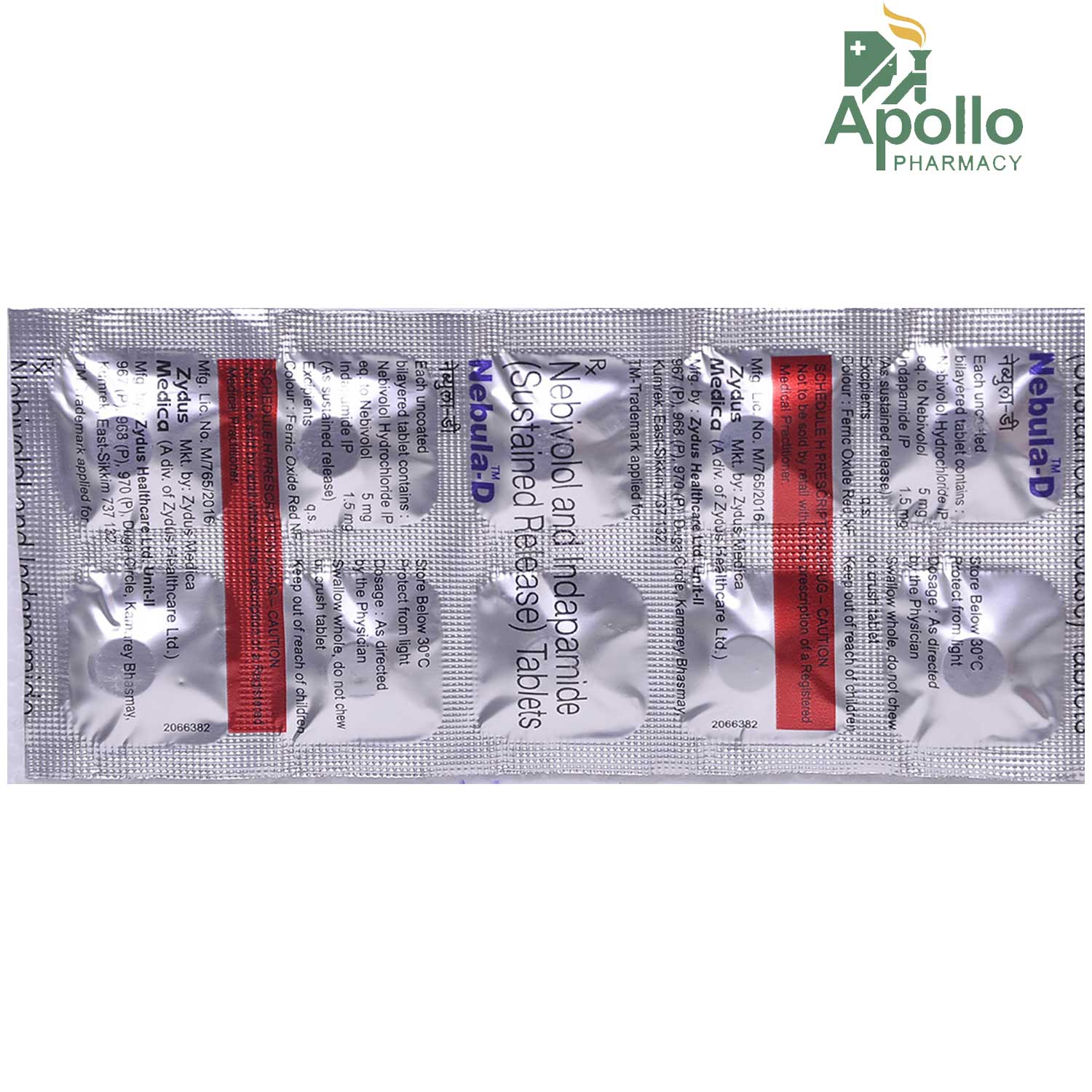Nebula-D Tablet 10's
MRP ₹252.5
(Inclusive of all Taxes)
₹37.9 Cashback (15%)
Provide Delivery Location
Online payment accepted
 Prescription drug
Prescription drugWhats That
Composition :
Manufacturer/Marketer :
Consume Type :
Expires on or after :
Return Policy :
About Nebula-D Tablet
Nebula-D Tablet is a combination drug containing antihypertensive medication, primarily used to treat high blood pressure (hypertension). Hypertension (High blood pressure) is a condition in which the force exerted by the blood against the artery walls becomes so high that it causes health problems, such as heart disease. It is also used to reduce strokes and chest pain (angina) caused by the arteries' blockage. In addition to this, Nebula-D Tablet is also used to treat preterm labour.
Nebula-D Tablet contains Nebivolol and Indapamide. Nebivolol is a beta-blocker; that relaxes and widens the blood vessels making it easier for the heart to pump blood to all parts of the body. This helps in decreasing the blood pressure and the risk of having a heart attack or stroke. Indapamide is a thiazide diuretic that inhibits excess salt absorption in the body, resulting in increased chloride, sodium, and water excretion through urine. This diuresis process (increased urine production) and excess salts and fluid removal help lower blood pressure.
Take Nebula-D Tablet as prescribed by your doctor. You are advised to take Nebula-D Tablet for as long as your doctor has prescribed it for you, depending upon your medical condition. You may experience nausea, constipation, fatigue, headache, stomach pain, diarrhoea, indigestion, weakness, dizziness, cough, peripheral oedema (swelling in feet and hands), nervousness, hypertonia (increased muscle tone) in some cases. Most of these side effects of Nebula-D Tablet do not require medical attention and gradually resolve over time. However, if the side effects are persistent, reach out to your doctor.
Try not to stop taking this medicine of your own as it may suddenly increase blood pressure, chest pain or may cause a heart attack. Let your doctor know if you have any liver or heart problems, are pregnant or breastfeeding. You should monitor your blood pressure regularly to be sure that the Nebula-D Tablet is working efficiently. And also, a healthy diet, regular exercise is necessary to keep blood pressure under control. Do not eat grapefruit or drink grapefruit juice while you're taking nifedipine. It can make side effects worse. Even a small reduction in sodium in your diet helps improve your heart's health and reduce blood pressure. Avoid alcohol consumption while taking Nebula-D Tablet as it might lower the blood pressure than normal.
Uses of Nebula-D Tablet
Directions for Use
Key Benefits
Nebula-D Tablet is a combination drug containing antihypertensive medication, Nebivolol, and Indapamide, primarily used to treat high blood pressure (hypertension). In addition to this, nebivolol also helps prevent increased heart rate and controls heart pumping strength, and indapamide also treats fluid retention and overload (oedema) in congestive heart failure patients. Nebivolol is a beta-blocker; that relaxes and widens the blood vessels making it easier for the heart to pump blood to all parts of the body. This helps in decreasing the blood pressure and the risk of having a heart attack or stroke. Indapamide is a thiazide diuretic that inhibits excess salt absorption in the body, resulting in increased chloride, sodium, and water excretion through urine. This diuresis process (increased urine production) and excess salts and fluid removal help lower blood pressure.
Storage
- Rest well; get enough sleep.
- Eat a balanced diet and drink enough water.
- Manage stress with yoga and meditation.
- Limit alcohol and caffeine.
- Physical activities like walking or jogging might help boost energy and make you feel less tired.
- Inform your doctor about dizziness symptoms. They may adjust your medication regimen or prescribe additional medications to manage symptoms.
- Follow your doctor's instructions for taking medication, and take it at the same time every day to minimize dizziness.
- When standing up, do so slowly and carefully to avoid sudden dizziness.
- Avoid making sudden movements, such as turning or bending quickly, which can exacerbate dizziness.
- Drink plenty of water throughout the day to stay hydrated and help alleviate dizziness symptoms.
- If you're feeling dizzy, sit or lie down and rest until the dizziness passes.
- Track when dizziness occurs and any factors that may trigger it, and share this information with your doctor to help manage symptoms.
- Hydrate your body: Drink enough water to prevent dehydration and headaches.
- Calm Your Mind: Deep breathing and meditation can help you relax and relieve stress.
- Rest and Recharge: Sleep for 7-8 hours to reduce headache triggers.
- Take rest: lie down in a quiet, dark environment.
- Cold or warm compresses can help reduce tension.
- Stay Upright: Maintain good posture to keep symptoms from getting worse.
- To treat headaches naturally, try acupuncture or massage therapy.
- Over-the-counter pain relievers include acetaminophen and ibuprofen.
- Prescription Assistance: Speak with your doctor about more substantial drug alternatives.
- Severe Headaches: Seek emergency medical assistance for sudden, severe headaches.
- Frequent Headaches: If you get reoccurring headaches, consult your doctor.
- Headaches with Symptoms: Seek medical attention if your headaches include fever, disorientation, or weakness.
- Inform Your Doctor: Notify your doctor immediately about your diarrhoea symptoms. This allows them to adjust your medication or provide guidance on managing side effects.
- Stay Hydrated: Drink plenty of fluids to replace lost water and electrolytes. Choose water, clear broth, and electrolyte-rich drinks. Avoid carbonated or caffeinated beverages to effectively rehydrate your body.
- Follow a Bland Diet: Eat easy-to-digest foods to help firm up your stool and settle your stomach. Try incorporating bananas, rice, applesauce, toast, plain crackers, and boiled vegetables into your diet.
- Avoid Trigger Foods: Steer clear of foods that can worsen diarrhoea, such as spicy, fatty, or greasy foods, high-fibre foods, and dairy products (especially if you're lactose intolerant).
- Practice Good Hygiene: Maintain good hygiene to prevent the spread of infection. To stay healthy, wash your hands frequently, clean and disinfect surfaces regularly, and avoid exchanging personal belongings with others.
- Take Anti-Diarrheal Medications: If your doctor advises, anti-diarrheal medications such as loperamide might help manage diarrhoea symptoms. Always follow your doctor's directions.
- Keep track of your diarrhoea symptoms. If they don't get better or worse or are accompanied by severe stomach pain, blood, or dehydration signs (like extreme thirst or dark urine), seek medical help.
- Inform your doctor about the nausea and discuss possible alternatives to the medication or adjustments to the dosage.
- Divide your daily food intake into smaller, more frequent meals to reduce nausea.
- Opt for bland, easily digestible foods like crackers, toast, plain rice, bananas, and applesauce.
- Avoid certain foods that can trigger nausea, such as fatty, greasy, spicy, and smelly foods.
- Drink plenty of fluids, such as water, clear broth, or electrolyte-rich beverages like coconut water or sports drinks.
- Use ginger (tea, ale, or candies) to help relieve nausea.
- Get adequate rest and also avoid strenuous activities that can worsen nausea.
- Talk to your doctor about taking anti-nausea medication if your nausea is severe.
- Record when your nausea occurs, what triggers it, and what provides relief to help you identify patterns and manage your symptoms more effectively.
Drug Warnings
Do not skip any doses or stop taking Nebula-D Tablet without consulting your doctor. Avoid intake of Nebula-D Tablet if you are allergic to any of its contents. Talk to your doctor if you have heart, kidney, or liver problems. Do not take Nebula-D Tablet if you have low blood pressure, serious circulation problems in arms and legs, very slow heartbeat, serious heart rhythm problems, recent heart failure, asthma, liver function disorder, or metabolic disorder. Avoid taking Nebula-D Tablet if you are pregnant or breast-feeding, and talk to your doctor. Avoid alcohol consumption while taking Nebula-D Tablet as it might lower the blood pressure than normal. Nebula-D Tablet is not recommended for children below the age of 18 years as the efficacy and safety have not been established. Regular monitoring of blood pressure, electrolyte levels, and kidney functioning is advised while taking Nebula-D Tablet .
Drug-Drug Interactions
Drug-Drug Interactions
Login/Sign Up
Taking Droperidol with Nebula-D Tablet can lead to severe heart problems.
How to manage the interaction:
Taking Droperidol with Nebula-D Tablet is not recommended, but can be taken if prescribed by the doctor.
Taking Protriptyline along with Nebula-D Tablet can lead to serious heart problems.
How to manage the interaction:
Taking Protriptyline with Nebula-D Tablet is not recommended, but can be taken if prescribed by the doctor.
Taking Nebula-D Tablet with Thioridazine can increase the risk of heart problems.
How to manage the interaction:
Taking Thioridazine with Nebula-D Tablet is not recommended, but can be taken if prescribed by the doctor.
Co-administration of Nebula-D Tablet with Dofetilide can increase the risk of abnormal heart rhythm.
How to manage the interaction:
Taking Nebula-D Tablet and Dofetilide together can result in an interaction, it can be taken if a doctor has advised it. However, if you experience sudden dizziness, fainting, shortness of breath, rapid heartbeat, weakness, muscle pain, cramps, nausea, or vomiting, consult a doctor immediately. Do not discontinue any medications without a doctor's advice.
Co-administration of Amiodarone together with Nebula-D Tablet may raise the risk of an abnormal heart rhythm.
How to manage the interaction:
Even though Amiodarone and Nebula-D Tablet interact, they can be used if prescribed by a doctor. If you experience abrupt dizziness, lightheadedness, fainting, shortness of breath, or rapid heartbeat, painful muscle cramping, get medical attention. Do not discontinue any medications without consulting a doctor.
Taking Nebula-D Tablet with Lithium can increase the blood levels of lithium.
How to manage the interaction:
Taking Nebula-D Tablet with Lithium can result in an interaction, but it can be taken if a doctor has advised it. However, if you experience symptoms like loose stools, vomiting, drowsiness, shaking of hands and legs, thirst, increased urination, lack of coordination, or muscle weakness, consult a doctor. Do not discontinue any medications without a doctor's advice.
Co-administration of Nebula-D Tablet with Arsenic trioxide can increase the risk of abnormal heart rhythms.
How to manage the interaction:
Taking Nebula-D Tablet and Arsenic trioxide together can result in an interaction, it can be taken if a doctor has advised it. However, if you experience sudden dizziness, lightheadedness, fainting, shortness of breath, rapid heartbeat, weakness, tiredness, drowsiness, confusion, muscle pain, cramps, nausea, or vomiting, consult a doctor immediately. Do not discontinue any medications without a doctor's advice.
Co-administration of Tizanidine with Nebula-D Tablet may reduce blood pressure greatly leading to side effects.
How to manage the interaction:
Although taking Nebula-D Tablet and Tizanidine together can cause an interaction, it can be taken if a doctor has suggested it. However, if you notice any of these signs - feeling dizzy, having a headache, feeling lightheaded, or fainting, Consult a doctor. Do not discontinue any medications without a doctor's advice.
Using Aminolevulinic acid with Nebula-D Tablet, your skin becomes more sensitive to strong light. This increases your risk of getting a bad sunburn.
How to manage the interaction:
Although taking Nebula-D Tablet and Aminolevulinic acid together can cause an interaction, it can be taken if a doctor has suggested it. After treatment, you should wait 48 hours before exposing your eyes, and skin, to any bright lights indoors. Do not discontinue any medications without a doctor's advice.
When Nebula-D Tablet and Dronedarone are taken together, the risk of an irregular heart rhythm increases.
How to manage the interaction:
Taking Nebula-D Tablet and Dronedarone together can possibly result in an interaction, it can be taken if a doctor has advised it. However, if you experience sudden dizziness, lightheadedness, fainting, shortness of breath, rapid heartbeat, weakness, tiredness, drowsiness, confusion, muscle pain, cramps, nausea, or vomiting, consult a doctor immediately. Do not discontinue any medications without a doctor's advice.
Drug-Food Interactions
Drug-Food Interactions
Login/Sign Up
Diet & Lifestyle Advise
- Keep your weight under control with a body mass index (BMI) between 19.5 and 24.9.
- Do regular physical activity or exercise for at least 150 minutes per week, or about 30 minutes most days of the week. Doing this can help you to lower your raised blood pressure by about 5 mm of Hg.
- Limit sodium chloride intake (table salt) in your daily diet to 2300 mg per day or less than 1500 mg is ideal for most adults.
- If you are taking alcohol, use only one serving for women and two servings for men.
- Quit smoking to lower the risk of heart diseases.
- Avoid chronic stress as it can raise your blood pressure. Try to enjoy and spent time with your loved ones to cope with stress.
- Monitor your blood pressure daily, and if you notice any fluctuations frequently, please contact your doctor immediately.
- Try including heart-healthy omega 3 fatty acid-containing foods in your daily diet. You can also use low-fat cooking oils like olive oil, soybean oil, canola oil, and coconut oil that help in lowering your elevated blood pressure.
Side Effects of Nebula-D Tablet
- Nausea
- Constipation
- Fatigue
- Headache
- Stomach pain
- Diarrhoea
- Indigestion
- Weakness
- Dizziness, Infection
- Cough
- Peripheral oedema (swelling in feet and hands)
- Nervousness
Habit Forming
Therapeutic Class
All Substitutes & Brand Comparisons
Drug-Diseases Interactions
Drug-Diseases Interactions
Login/Sign Up
FAQs
Nebula-D Tablet contains Nebivolol and Indapamide. Nebivolol works by relaxing and widening the blood vessels making it easier for the heart to pump blood to all parts of the body. This helps in decreasing the blood pressure and the risk of having a heart attack or stroke. Indapamide inhibits excess salt absorption in the body, resulting in increased chloride, sodium, and water excretion through urine. This diuresis process (increased urine production) and excess salts and fluid removal help lower blood pressure.
Please do not stop taking Nebula-D Tablet without consulting your doctor on your own as it may lead to a rise in blood pressure. Continue taking Nebula-D Tablet for as long as your doctor has prescribed it to you. Do not be reluctant to speak with your doctor if you experience any difficulty while taking Nebula-D Tablet .
If you have diabetes, you should monitor your blood glucose levels often as Nebula-D Tablet might mask hypoglycemia symptoms (low glucose levels). However, please consult your doctor before taking Nebula-D Tablet if you have diabetes
Nebula-D Tablet may cause swelling of hands or feet. This could be due to edema (fluid retention). Talk to your doctor if you think you have gained weight or have trouble breathing while taking Nebula-D Tablet .
Do not overdose on Nebula-D Tablet or any medicine, which could lead to very unpleasant side effects. Take Nebula-D Tablet only as prescribed by your doctor. An overdose of Nebula-D Tablet can cause a very slow heartbeat, low blood pressure, breathlessness, and acute heart failure. Rush to your nearest doctor as early as possible if you have overdosed on Nebula-D Tablet .
Drug-Drug Interactions Checker List
- HYDROCHLOROTHIAZIDE
- FUROSEMIDE
- CHLORTHALIDONE
- RAMIPRIL
- METOPROLOL
- AMLODIPINE
- ALPRAZOLAM
- AMISULPRIDE
- IBUPROFEN
- NAPROXEN
- LITHIUM
- INSULIN GLARGINE
- METFORMIN
- ESOMEPRAZOLE
- PREDNISONE
- SILDENAFIL
Special Advise
- Monitor your blood pressure regularly and seek medical advice if you notice any drastic fluctuations.
- Let your doctor know if you are advised for any blood examinations as, diuretics like Indapamide can cause changes in the laboratory parameters like low potassium levels in the blood, low sodium in the blood, low blood pressure, increase in uric acid, increase in blood glucose levels in diabetic patients, increase in calcium levels in the blood, and increase in the liver enzyme levels.
- Athletes should be aware that Indapamide in Nebula-D Tablet gives a positive reaction in doping tests.
Disease/Condition Glossary
Hypertension: It is a chronic condition when blood pressure is too high. Blood pressure is defined as the amount of blood pumped by the heart and the amount of resistance exerted by the arteries against the blood flow. If the heart pumps more blood, then arteries become narrower, and in turn, blood pressure becomes high. If blood pressure becomes uncontrolled, it may lead to serious heart diseases, including stroke and heart attack. Additionally, high blood pressure can also cause brain damage (stroke) and kidney failure. Blood pressure is expressed as systolic and diastolic pressures. Systolic blood pressure represents the contraction and relaxation of the heart. Diastolic pressure is exerted in the blood vessels when the heart beats and is in the resting state. Ideal blood pressure should be between 90/60mmHg and 120/80mmHg. Hypertension is detected when systolic blood pressure is more than 140mmHg, and diastolic pressure is higher than 90mmHg. Some of the symptoms of hypertension include headache, nose bleed, vomiting, and chest pain.

Have a query?
Alcohol
Safe if prescribed
Alcohol may lower your blood pressure. It would help if you avoided or limit consuming alcohol whilst taking this medicine
Pregnancy
Consult your doctor
It is not recommended to take Nebula-D Tablet while pregnant as it is a pregnancy category C drug, and it is unknown whether it will harm the baby. Please consult your doctor if you have any concerns regarding this; your doctor will prescribe you Nebula-D Tablet only if the benefits outweigh the risks.
Breast Feeding
Consult your doctor
There are limited studies on how Nebula-D Tablet affects the breastfed infants. However, Indapamide in Nebula-D Tablet may pass into the breast milk during breastfeeding. Please consult your doctor before using Nebula-D Tablet if you are a lactating mother.
Driving
Safe if prescribed
Nebula-D Tablet may cause side effects due to lowering of the blood pressure such as dizziness or tiredness. If you feel dizzy or tired when taking this medicine, do not drive or use any tools or machines.
Liver
Consult your doctor
Dose adjustment may be needed. Nebula-D Tablet should be used with caution in patients with liver impairment/liver disease. Please consult your doctor if you have kidney impairment or any concerns regarding this.
Kidney
Consult your doctor
Dose adjustment may be needed. Nebula-D Tablet should be used with caution in patients with kidney impairment/kidney disease. Please consult your doctor if you have kidney impairment or any concerns regarding this.
Children
Safe if prescribed
Nebula-D Tablet is not recommended for use in people below 18 years of age.
Recommended for a 30-day course: 3 Strips


